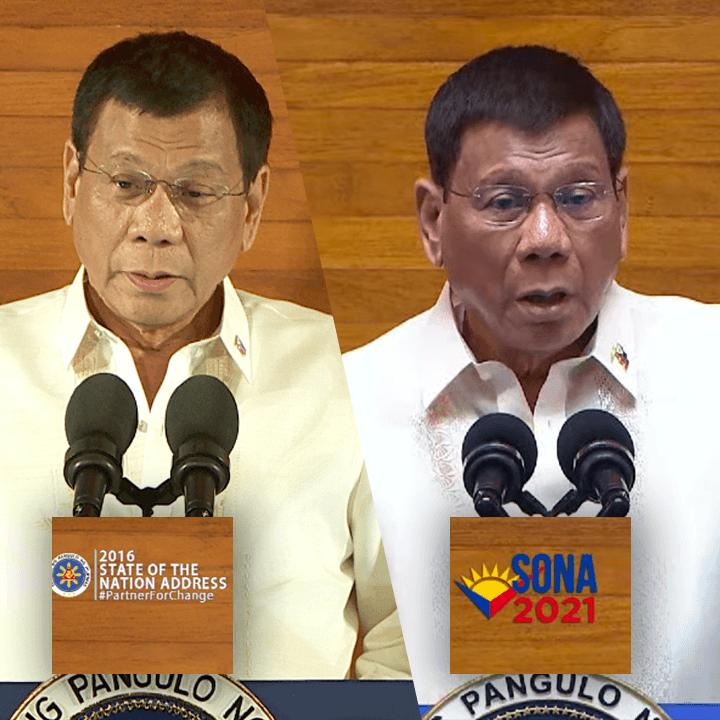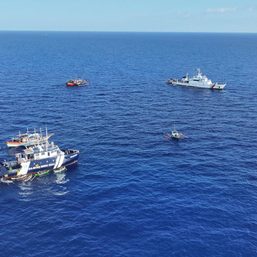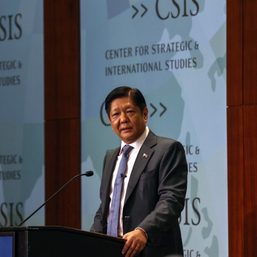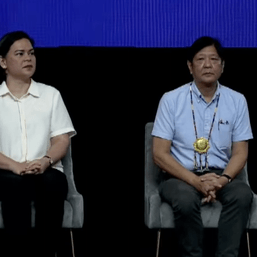SUMMARY
This is AI generated summarization, which may have errors. For context, always refer to the full article.

There was nothing that President Rodrigo Duterte said in his final State of the Nation Address (SONA) that we had not heard before, but his statements on some issues on Monday, July 26, departed from what he said during his first address in 2016.
The speech lasted 2 hours and 45 minutes – the longest by any president post-EDSA Revolution – and it covered infrastructure, illegal drugs, and the pandemic, among other talking points that were staple in his ordinary speaking engagements and briefings.
But what changed between his first SONA in 2016 and last SONA in 2021? Rappler counted at least four changes in reference to the following:
- Historic Hague ruling on the West Philippine Sea
- Corruption in government
- Communist insurgency
- War on drugs
West Philippine Sea and the Hague ruling
First State of the Nation Address (2016):
“With regard to the West Philippine Sea otherwise known as [South] China Sea, we strongly affirm and respect the outcome of the case before the Permanent Court of Arbitration as an important contribution to the ongoing efforts to pursue the peaceful resolution and management of our disputes.”
Final State of the Nation Address (2021):
“Ito bang arbitral ruling…. America and some Filipinos – brilliant Filipinos I would say – keep on pushing for something which I do not know…. Ano ba ang gusto ninyo? What will I do with a document that does not bind China because they were never a part of that arbitration?
“…There was really no arbitration at all because it was only the Philippine side was heard. Well and good. But ito ngayon that there is the arbitral ruling, you know, I do not want to insult these people pushing me for something more than what I can handle. At ano ang gusto nila, makipaggiyera? ‘Do something.’ What do something? Do you want war against China? Well, I’ll tell you, even on the coast beach of Palawan, before you can take off, the missile of China would be there in about 5 or 10 minutes. It would be a massacre if I go and fight a war now. We are not yet a competent and able enemy of the other side.”
Context: In his 2021 SONA, Duterte maintained his defeatist stance towards China regarding the West Philippine Sea. He again downplayed the importance of the ruling by the Permanent Court of Arbitration in 2016, which invalidated China’s claim to waters within the Philippines’ exclusive economic zone.
Calling the Hague ruling “a document that does not bind China” reflects his previous statements in which he dismissed it as nothing but a piece of paper that he would throw in a trash can.
But during his first SONA in 2016 – and a 2020 speech before the United Nations – Duterte said that his government strongly affirmed the ruling.
Fighting corruption in government
First State of the Nation Address (2016):
“I said that the fight against criminality and illegal drugs and corruption will be relentless and sustained…. For those who have valid reasons to complain about graft and corruption, the gates of Malacañang will be open. Doon ka. Magsumbong ka.”
Final State of the Nation Address (2021):
“Corruption, it’s endemic in government. You cannot stop corruption. Nobody can stop corruption unless you overturn the government completely. If I were the next president, if you think there’s really a need for you to change everybody in the system, then you declare martial law and fire everybody and allow the new generation to come in to work for the government. Eh kung hindi mo ganunin, walang mangyari. Nandiyan – it’s in the system eh.”
Context: Duterte’s presidential campaign in 2016 promised to address corruption in government. He often reiterated that he would not tolerate corrupt officials under his administration, emphasizing that he would fire them over “even a whiff or whisper” of anomalous acts.
Yet, over the years, Duterte’s actions betrayed this promise. He has reappointed, promoted, or retained in different capacities several government officials who were accused of corruption.
In his last SONA, Duterte conceded that corruption couldn’t be stopped, even saying that his successor should declare martial law to address this problem.
Communist insurgency
First State of the Nation Address (2016):
“To immediately stop violence on the ground, restore peace in the communities and provide enabling environment conducive to the resumption of the peace talks. I am now announcing a unilateral ceasefire with the CPP/NPA/NDF effective immediately, and call on our Filipinos in the National Democratic Front and its forces to respond accordingly. Let me make this appeal to you: ‘If we cannot, as yet, love one another, then, in God’s name, let us not hate each other too much,’ so it was said. I say the same to you today. We will strive to have a permanent and lasting peace before my term ends. That is my goal, that is my dream.”
Final State of the Nation Address (2021):
“Alam mo, mag-istorya muna tayo sa taxation. I’d like to be frank with you. Everybody, as everybody in this country, are (sic) paying taxes to the communists. The Communist Party earns billions but pass on a little to their fighting men who die for an ideology that is so rotten and corrupt.
“They themselves are pocketing the money and their children are studying in Europe and in other places, which I think none of you here can finance such journey. Iyan ang masakit dito. They collect taxes, support [Jose Maria] Sison in Netherlands, and they do nothing but bad-mouth government and mouth the war dogmas and everything.
“Hindi na sila napagod. It’s about 53 years in the making. And, until today, the poor people are dying. The cadres and most of them belonging to the indigenous tribes of our country are fighting a losing battle between the communist and the government. They waste lives, they enlist children, and they are proud of it, but they deny it.”
Context: Duterte’s campaign and his first few months in office were marked with a favorable approach to the long-running communist insurgency in the Philippines. He had warm relations with progressive groups, even declared himself the only leftist and socialist presidential candidate. He appointed some of these activists to Cabinet positions.
He formally ended peace talks with the Left in December 2017. In April 2020, Duterte said that he would “not and never be ready for any round of talks.” (READ: The end of the affair? Duterte’s romance with the Reds)
The Duterte government created the National Task Force to End Local Communist Armed Conflict (NTF-ELCAC), which has since gone on a red-tagging spree, accusing government critics, even celebrities, of being part of the communist movement.
Activists and members of progressive groups are on the receiving end of threats and harassment from state forces, while many have been killed. (READ: Duterte ushers in new level of danger for activists, human rights defenders)
Illegal drugs
First State of the Nation Address (2016):
“If you are able to contaminate – kagaya ng negosyo ng mga Chinese, wholesale ’yan sila – maski konti-konti, kung the whole of Tondo contaminated, pera ’yan. I am not saying it’s the Chinese. Practice of nitong wholesale, retail. They go for wholesale. Maski na kumita lang ng isang piso diyan sa isang…okay na ’yan. Kasi paramihan eh. Iyan ang ibig kong sabihin.
“…Alam mo, kayong mga media, naghahanap kayo ng, ‘Where’s the big fish?’ ‘Saan ’yung bilyonaryo na mayaman, ’yung may kotse, ’yung may mga Mercedez na ’yan?’ Ma’am, nandoon ’yan sila sa labas, wala dito. Maghanap ka ng isang batalyon na pulis para hulihin natin doon. Kung kaya natin. They direct the traffic of drugs sa kanila. Meron silang ganito, malaki. Real time. Nakikinig sila ngayon dito.”
Final State of the Nation Address (2021):
“Kaya ’yan ang masakit sa loob ko. I did not know that I was fighting my own government. Customs and everyone else were facilitating the importation of drugs. And, one importation, as you can see it every night on TV, the police now seize about almost a billion worth of drugs every day. And if you look at the [8888], there are about a thousand Filipinos arrested every day by the police in connection with drug trafficking. And that is why I go crazy looking at the situation. They are still around. We do not have the laboratories now because nawala na sila at itong naiwan ngayon are doing the importation. The citizens of another country cooked their shabu in their – [Anong tawag nitong…?] – in their tugboat or something, and they threw out the product in – contained in the plastic bags and with GPS attached to the contraband so that the importers here could find them easily. That is how we are fighting almost losing a battle against drugs. And now the [Sinaloa] gangsters of Mexico and the Triad of Laos in that area, they are busy cooking and we have the Filipinos here – with no, with nothing in their mind except to destroy a nation – distribute them. That is what I said.”
Context: President Duterte did not explicitly mention China or Chinese in relation to illegal drugs in his last SONA, unlike during his first address in 2016. He instead cited other foreign syndicates that he alleged were involved in the illegal drug trafficking in the country.
Duterte also admitted that he was going against people inside his government in his fight against illegal drugs, something that he did not mention in 2016.
At least 22,093 out of 42,045 barangays (villages) across the Philippines have been tagged as drug-cleared, as of May 31, 2021. A report from the United Nations Office on Drugs and Crime stated that shabu was still a main cause of drug concern in the country.
Duterte’s war on drugs, which continues to be bloody, has led to the loss of thousands of lives. At least 7,884 have been killed as of August 2020, based on government data collected by Rappler, fewer than what is being reported by state agencies. Human rights groups, however, maintain that the number of those killed, if including those killed by vigilantes, could go as high as 20,000 to 30,000. (READ: How the Duterte government underreports drug war killings)
The International Criminal Court’s Office of the Prosecutor already sought to open an investigation into the alleged crimes against humanity committed under Duterte’s flagship program.
– with a report from Camille Elemia/Rappler.com
Add a comment
How does this make you feel?

![[ANALYSIS] How have scholars confronted the war on drugs in the Philippines?](https://www.rappler.com/tachyon/2024/05/tl-scholars-war-on-drugs.jpg?resize=257%2C257&crop_strategy=attention)



![[Rappler Investigates] Deal or no deal, Duterte?](https://www.rappler.com/tachyon/2024/05/deal-or-no-deal-duterte-may-16-2024.jpg?resize=257%2C257&crop=422px%2C0px%2C1080px%2C1080px)



There are no comments yet. Add your comment to start the conversation.